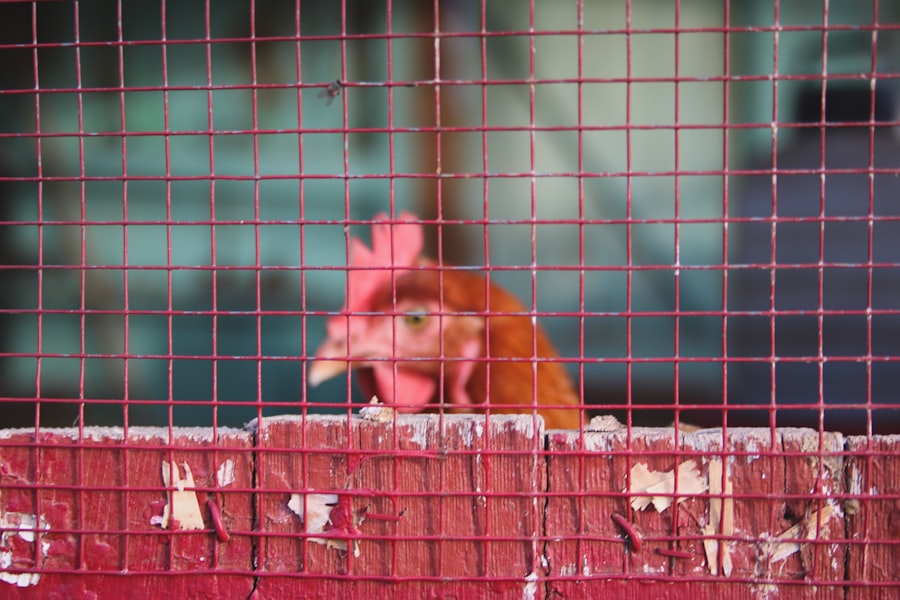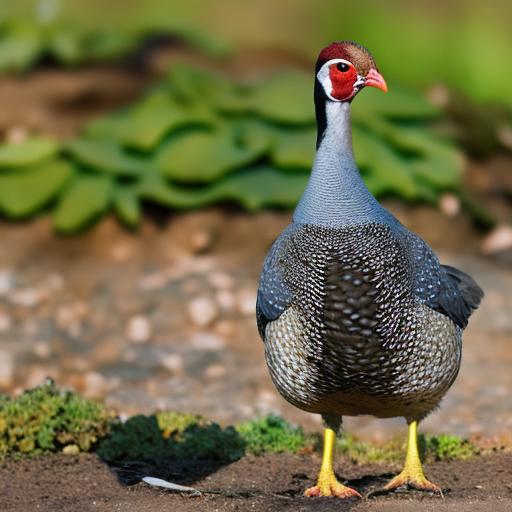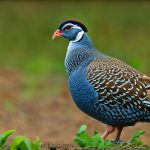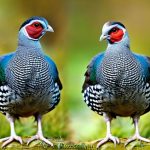Guinea fowl are known for their unique and sometimes quirky behavior. They are social birds that prefer to live in flocks, and they have a strong instinct to forage for food. They are also highly alert and can be easily startled, which can lead to them flying off in a panic. Understanding these behaviors is crucial for effectively managing guinea fowl on your property.
Guinea fowl are natural foragers, and they will spend a significant amount of time searching for insects, seeds, and other small creatures to eat. This means that they can be beneficial for controlling pests in your yard or garden. However, their foraging behavior can also lead them to wander into areas where they are not welcome, such as your neighbor’s garden or flower beds. Additionally, guinea fowl are known for their loud calls, especially when they feel threatened or are trying to communicate with their flock. This can be disruptive to you and your neighbors, especially if you live in a residential area.
In order to effectively manage guinea fowl on your property, it is important to understand their natural behaviors and instincts. By doing so, you can implement strategies to keep them contained and minimize any potential disruptions to your neighbors.
Key Takeaways
- Guinea fowl are social birds that prefer to roost in trees and forage on the ground during the day
- A secure enclosure with high fencing and a covered top is essential to keep guinea fowl safe from predators
- Visual deterrents such as scarecrows and reflective objects can help keep guinea fowl away from sensitive areas
- Noise barriers like wind chimes or motion-activated alarms can discourage guinea fowl from entering unwanted areas
- Communicate with your neighbors to establish boundaries and address any concerns about your guinea fowl
- Consider seeking professional help from a veterinarian or animal behaviorist if you encounter challenges with your guinea fowl
- Responsible guinea fowl ownership involves providing proper care, monitoring their behavior, and addressing any issues that may arise
Building a Secure Enclosure
One of the most effective ways to manage guinea fowl on your property is to build a secure enclosure for them. This will not only keep them contained and prevent them from wandering into areas where they are not welcome, but it will also provide them with a safe and comfortable space to live. When building an enclosure for guinea fowl, it is important to consider their natural behaviors and instincts. Guinea fowl are known for their ability to fly, so the enclosure should have a roof or be tall enough to prevent them from flying out.
The enclosure should also have a secure fence that is buried into the ground to prevent guinea fowl from digging underneath it. Additionally, the enclosure should provide shelter from the elements, such as a coop or sheltered area where the guinea fowl can roost at night. Providing ample space for the guinea fowl to roam and forage is also important for their well-being. By building a secure enclosure for your guinea fowl, you can ensure that they are contained and safe while also minimizing any potential disruptions to your neighbors.
Using Visual Deterrents
Visual deterrents can be an effective way to keep guinea fowl away from areas where they are not welcome. Guinea fowl are highly alert birds, and they can be easily startled by sudden movements or unfamiliar objects. By strategically placing visual deterrents around your property, you can discourage guinea fowl from entering certain areas.
One common visual deterrent is the use of scarecrows or other life-like figures that mimic predators. Guinea fowl are naturally wary of predators, so the presence of these figures can deter them from entering an area. Another visual deterrent is the use of reflective objects, such as shiny tape or CDs, which can create flashes of light that startle guinea fowl and discourage them from approaching. Additionally, you can use visual barriers, such as fencing or netting, to block off areas where guinea fowl are not welcome.
By using visual deterrents strategically, you can effectively manage guinea fowl on your property and minimize any potential disruptions to your neighbors.
Creating Noise Barriers
Guinea fowl are known for their loud calls, especially when they feel threatened or are trying to communicate with their flock. This can be disruptive to you and your neighbors, especially if you live in a residential area. Creating noise barriers can help minimize the impact of guinea fowl calls on your neighbors.
One effective noise barrier is the use of vegetation, such as hedges or shrubs, which can help absorb sound and reduce the distance that guinea fowl calls travel. Another option is the use of sound-absorbing materials, such as acoustic panels or barriers, which can help dampen the noise from guinea fowl calls. Additionally, you can strategically place structures or objects, such as sheds or outbuildings, to help block the sound from traveling towards your neighbors.
By creating noise barriers around your property, you can help minimize the impact of guinea fowl calls on your neighbors while still allowing the birds to roam and forage freely.
Establishing Boundaries with Your Neighbors
When keeping guinea fowl on your property, it is important to establish clear boundaries with your neighbors. Communicating openly and honestly with your neighbors about your plans to keep guinea fowl can help prevent potential conflicts and misunderstandings. It is important to listen to any concerns that your neighbors may have and work together to find solutions that are mutually beneficial.
One way to establish boundaries with your neighbors is to clearly define the areas where the guinea fowl will be allowed to roam and forage. By doing so, you can help prevent the birds from wandering into areas where they are not welcome, such as your neighbor’s garden or flower beds. Additionally, it is important to be mindful of the noise that guinea fowl may produce and take steps to minimize any potential disruptions to your neighbors.
By establishing clear boundaries with your neighbors and working together to find solutions that are mutually beneficial, you can help ensure that keeping guinea fowl on your property does not cause any conflicts with those around you.
Seeking Professional Help

If you are struggling to manage guinea fowl on your property and minimize any potential disruptions to your neighbors, it may be helpful to seek professional help. There are professionals who specialize in wildlife management and can provide guidance and assistance in managing guinea fowl effectively.
A wildlife management professional can assess your property and provide recommendations for managing guinea fowl in a way that minimizes any potential disruptions to your neighbors. They can also help you implement strategies, such as building secure enclosures or using visual deterrents, that are tailored to your specific situation. Additionally, a professional can help mediate any conflicts with your neighbors and work towards finding solutions that are mutually beneficial.
By seeking professional help, you can gain valuable insights and support in managing guinea fowl on your property while also maintaining positive relationships with your neighbors.
Being a Responsible Guinea Fowl Owner
As a responsible guinea fowl owner, it is important to take proactive steps to manage your birds in a way that minimizes any potential disruptions to your neighbors. This includes building secure enclosures, using visual deterrents, creating noise barriers, establishing boundaries with your neighbors, and seeking professional help when needed.
It is also important to regularly assess the impact of your guinea fowl on your neighbors and make adjustments as needed. This may include modifying the layout of their enclosure or implementing additional strategies to minimize noise or other disruptions. Additionally, being open and communicative with your neighbors about your plans for keeping guinea fowl can help prevent conflicts and misunderstandings.
By being a responsible guinea fowl owner and taking proactive steps to manage your birds effectively, you can ensure that keeping guinea fowl on your property does not cause any disruptions to those around you.
Looking to keep your guinea fowl from wandering into your neighbor’s yard? Check out this helpful article on Poultry Wizard for tips and tricks on managing your guinea fowl and preventing them from causing any disturbances.
FAQs
What are some effective methods for keeping guinea fowl out of your neighbor’s yard?
Some effective methods for keeping guinea fowl out of your neighbor’s yard include installing a fence, using scare tactics such as noise makers or visual deterrents, and providing alternative food sources to keep them away.
Why is it important to keep guinea fowl out of your neighbor’s yard?
It is important to keep guinea fowl out of your neighbor’s yard to maintain good neighborly relations and prevent potential damage to their property or garden.
Are there any legal implications of allowing guinea fowl to roam into your neighbor’s yard?
Allowing guinea fowl to roam into your neighbor’s yard could potentially lead to legal issues if they cause damage or disturbance. It is important to be mindful of local ordinances and regulations regarding livestock and animal control.
What are some humane ways to deter guinea fowl from entering your neighbor’s yard?
Humane ways to deter guinea fowl from entering your neighbor’s yard include using noise makers, visual deterrents, and providing alternative food sources to redirect their attention away from the neighbor’s property.
How can I communicate with my neighbor about keeping guinea fowl out of their yard?
It is important to have an open and respectful conversation with your neighbor about the issue. You can discuss potential solutions and come to a mutual agreement on how to keep the guinea fowl out of their yard.
Meet Walter, the feathered-friend fanatic of Florida! Nestled in the sunshine state, Walter struts through life with his feathered companions, clucking his way to happiness. With a coop that’s fancier than a five-star hotel, he’s the Don Juan of the chicken world. When he’s not teaching his hens to do the cha-cha, you’ll find him in a heated debate with his prized rooster, Sir Clucks-a-Lot. Walter’s poultry passion is no yolk; he’s the sunny-side-up guy you never knew you needed in your flock of friends!







